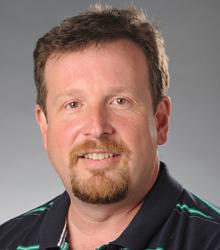Riccardo Fiorillo: DIRECTORY

TOP CLAW RECIPIENT
Dr. Riccardo Fiorillo
Professor of Biology
Biography
Dr. Riccardo Fiorillo was born in Naples, Italy, immigrated to the United States as a teenager and was the first in his family to attend college. He has a B.S. degree in biology, an M.S. in ecological parasitology from Southeastern Louisiana University and a Ph.D. with an emphasis in ecology and evolution from Mississippi State University. His teaching and research background is broad and organismal-based, and his research interests are primarily in ecological parasitology – especially the ecology of worm parasites of aquatic organisms ("Dr. Fio’ loves worms!!!"). But he also has a strong interest in the natural history/ecology of fish, amphibians and reptiles.
Fiorillo has several years of teaching and research experience. Having had the opportunity to teach at both a small liberal arts college and a larger regional university, Fiorillo is convinced that undergraduates benefit greatly when they are the focus of an institution’s mission.
It is partly for that reason that he chose to work at GGC. He is extremely excited about the small class sizes here and the opportunities for close faculty student interactions through teaching and research. Fiorillo truly enjoys being in the classroom and involving undergraduates in hands-on lab experiences and field research and believes strongly that "to be a biologist," one must "do biology." He has consistently and successfully involved undergraduates in research and he is hoping to continue to involve students in his research here at GGC.
Fiorillo is married with two young children, is crazy about soccer (the real football!!) and enjoys cooking, playing guitar and board games.
Education
- Doctorate – biological sciences (evolutionary ecology) – Mississippi State University
- Master's – biology (ecological parasitology) – Southeastern Louisiana University
- Bachelor's – biology – Southeastern Louisiana University
Academic Interests
- Parasite population and community structure/dynamics
- Host-parasite interactions
- Parasite life cycles
- Research opportunities for undergraduates